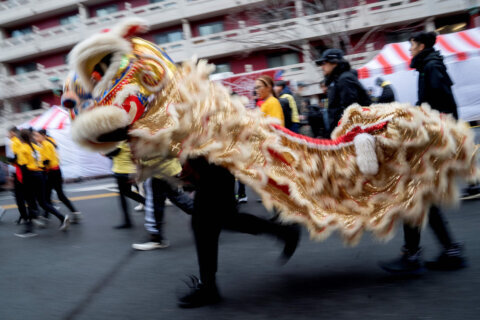Throughout February, WTOP is celebrating Black History Month. Join us on air and online as we bring you the stories, people and places that make up our diverse community.
Four years after Go-Go’s designation as “The Official Music of Washington D.C.,” and months after a celebrated ribbon-cutting that drew D.C. Mayor Muriel Bowser and Oscar-winning filmmaker Spike Lee, the proposed Go-Go Museum in Southeast is marching toward a planned opening date this April.
As it prepares for its grand opening, the museum is hosting “The Go-Go Honors” — a fundraiser and awards ceremony that honors the past, celebrates the present and inspires the future of Go-Go culture — at the Washington Capital National Mall Holiday Inn on Sunday, Feb. 18.
The celebration, part of what the Mayor’s Office of Cable Television, Film, Music and Entertainment calls “Keep the Beat Week,” will “honor and celebrate advocates and people within the Go-Go music community who have done things to preserve and elevate our music and culture,” Ronald Moten, museum founder and CEO of Don’t Mute D.C., told WTOP.
Among the honorees will be William Julius “JuJu” House, drummer for legendary Go-Go band EU (Experience Unlimited); Big Tony of classic Go-Go band Trouble Funk; Carol Kirkendall and Darryll Brooks, community organizers and producers of 1987’s “Go-Go Live,” the biggest event in go-go history; Bowser; and Council member Kenyon McDuffie, author of the bill that designated Go-Go as D.C.’s official music.
A museum for the culture
Commitment to grassroots fundraising and community involvement underscores the museum’s significance as a cultural touchstone built, owned and celebrated by the people it represents.
Moten reflected on the origins of the museum project: “Fifteen years ago, I was at the Go-Go Awards, and I was speaking. And I was talking about two issues: preserving our culture and music, and said, ‘We’ve got to fight for a Go-Go museum,’” Moten recalled.
“And then in 2019, we actually did the first fundraiser at the MetroPCS store with WPGC for the museum. And within that week, I believe we raised, like, $19,000. And most of that money came from people from the community. We had people pulling up, getting out of their cars balled-up dollars and $5 bills. And, to me, that’s what makes this so powerful, is that it’s coming from the community.”
Go-Go culture is ingrained in every aspect of the museum’s design and programming. Spanning just over 3,000 square feet, the museum may not boast extensive displays of large artifacts, but it promises to immerse visitors in the rich tapestry of Go-Go’s legacy through innovative storytelling. Moten envisions digital and interactive exhibitions adorning the walls and floors, guiding guests through the genre’s roots, pivotal moments, iconic venues and profound community impact. From tracing Go-Go’s lineage back to its West African ancestry to exploring its connections with hip-hop, the museum aims to capture the essence of a musical phenomenon that defines the soul of D.C.
One of the museum’s unique features is its integration of Go-Go history into the cafe’s offerings. Drawing inspiration from the eclectic sounds that birthed the genre, the cafe will serve up a fusion of African, Caribbean, Latin and mumbo-sauced dishes. The menu echoes the improvisational spirit of Go-Go, where Chuck Brown’s fusion of jazz, funk and salsa gave birth to a rhythm that “goes and goes.”
Beyond its walls, the museum extends its reach into the community with an event space, indoor and outdoor dining areas and a basement recording studio. But the museum’s impact doesn’t stop there. Moten’s vision extends beyond the physical space, manifesting in a 29-foot mobile museum, a testament to the music’s enduring legacy.
‘Go-Go is for everybody’
The museum’s significance transcends mere preservation; it’s a testament to the resilience and creativity of D.C.’s Black community.
As Moten aptly puts it, Go-Go is more than just music — it’s a superpower passed down from ancestors, weaving its way through the city’s past, present and future.
Additionally, Moten shared his recent experience of bringing Go-Go to Cuba, highlighting the global reach and universal appeal of the genre. He recounted: “They loved it because Go-Go was a part of it. It’s in our genes, it’s in our spirit — it’s everywhere. Our goal is to make sure that the world embraces Go-Go, but that we also make sure that it’s not colonized and destroyed and used as a way to destroy our people, like some other music has been used.”
The Go-Go Museum serves as a testament to the rich cultural heritage of Go-Go music and its enduring legacy in the District. It represents a milestone in the ongoing efforts to preserve and elevate the genre, ensuring that its vibrant history and contributions are recognized and celebrated for generations to come.
“We’re coming up on the 50th year of Go-Go, which we will be celebrating,” Moten said. “And it’s so important to save and preserve the music. Because if you don’t, somebody else will take it and run with it.”
Get breaking news and daily headlines delivered to your email inbox by signing up here.
© 2024 WTOP. All Rights Reserved. This website is not intended for users located within the European Economic Area.








